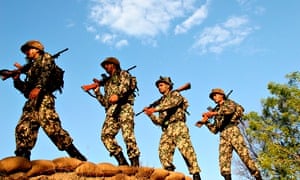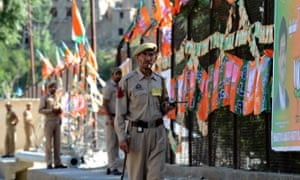 |
| Indian security personnel patrol the India-Pakistan border. Photograph: Alamy |
An Indian military operation along its eastern border with Burma has Pakistani leaders rattled, resulting in threats of swift retaliation should India ever try similar manoeuvres along its western border with Pakistan.
The Pakistani statements – which include provocative reminders that India is not the only subcontinent power with nuclear arms – are once again exposing the deep-rooted suspicions and lingering potential for conflict between the longstanding rivals despite groundbreaking outreach to ease tensions.
It has been worse. The two countries have fought three major wars since 1947, engaged in a nuclear arms race in the 1980s and clashed in the 1990s. But the current uneasiness underscores the challenges for leaders on both sides seeking to overcome the rifts and shift to shared issues, such as regional economic cooperation, water resources and the rise of militant factions.
Over the past month, Pakistani leaders have accused India of sponsoring terrorist attacks inside Pakistan and slandering it at international forums. Historical grievances also have been dusted off, such as claims that India helped force the loss of Pakistani territory – which would become Bangladesh – more than four decades ago.
Indian leaders, in turn, have been outraged by a Pakistani court decision in April to grant bail to Zaki-ur-Rehman Lakhvi, the alleged mastermind of the 2008 Mumbai terrorist attacks. Lakhvi was a commander in the Lashkar-e-Taiba, a militant group that has historical ties to Pakistan’s intelligence agency.
Now, the downturn in relations even includes open speculation in Pakistan about the possibility of a cross-border strike by India. Such worries – even though apparently remote – carry added resonance between countries that have troops facing each other in the disputed Kashmir region.
“This is coming back to 1980s levels,” said Muhammad Amir Rana, an Islamabad-based security analyst, referring to a period when both countries ramped up efforts to develop nuclear arms. “This is going to need more diplomatic and political efforts to lessen the tension.”
That tension intensified last week after Indian special forces conducted an operation to pursue rebels accused of killing 18 Indian soldiers earlier this month. Indian media has reported that those forces crossed the border into Burma, where they killed more than 50 militants.
Both the Indian army and the Burmese government have denied that Indian troops crossed the border. In a newspaper interview, however, India’s information minister, Rajyavardhan Rathore, said Indian forces had pushed deep into Burma. He called the operation a “message” to countries such as Pakistan that it will not hesitate to pursue threats outside of its borders.
“We will strike when we want to,” Rathore, a retired army officer, told the Indian Express newspaper.
The reaction from Pakistani leaders has been swift and severe – touching off a wildfire of social media comments on both sides of the border.
In a statement issued last Wednesday, Pakistani interior minister Chaudhry Nisar Ali Khan warned Indian prime minister Narendra Modi to think twice before threatening Pakistan. “Those who are contemplating any kind of adventure in Pakistan must know that they will get a bloody face in the process,” Khan said. “Those who have evil designs against us - listen carefully, Pakistan is not Burma.”
Pakistan’s defence minister, Khawaja Asif, even brought up the possibility of nuclear war should India ever launch a similar incursion into Pakistan. He urged the international community to intervene, telling Geo News the latest tension could prove a “harbinger of disaster” for South Asia.

Pakistan’s army chief, Raheel Sharif, chaired a meeting of his top commanders last Wednesday to discuss Pakistan’s worsening relationship with India. Over the past month, Pakistani leaders have repeatedly accused India’s intelligence agency, the Research and Analysis Wing (Raw), of sponsoring several recent terrorist attacks in Pakistan.
Indian leaders, meanwhile, have repeatedly accused the Pakistani intelligence agency of fueling discontent in Indian-controlled Kashmir while also supporting terrorist groups. Earlier this month, Bloomberg News reported that India’s minister of state for defence, Rao Inderjit Singh, is even worried that Islamic State militants could obtain a nuclear bomb from Pakistan.
Speaking at a Delhi event last Thursday, India’s defence minister, Manohar Parrikar, declined to discuss specifics of the Burma operation, but said that “those who fear India’s new posture have already started reacting”.
“You have seen for the last two to three days, a simple action against insurgents has changed the mindset of the full security scenario in the country,” Parrikar said.
Parrikar last month raised hackles in Pakistan by saying at a closed event that India would “neutralise” terrorists with terrorists – remarks he later said were taken out of context.
In a statement last Wednesday after the commanders’ meeting, Pakistan’s military said it has taken serious notice of “Indian hostile rhetoric coupled with covert and overt actions to destabilise Pakistan”. Pakistani military leaders “reiterated its resolve to defeat their designs and defend the territorial integrity of Pakistan at any cost with a befitting response”, the statement said.
Since Pakistan was partitioned from India in 1947, the two countries have fought three major wars, two of them over the disputed border region of Kashmir. The last major war, in 1971, occurred when India’s military supported a rebellion in East Pakistan. Pakistani forces were resoundingly defeated, resulting in East Pakistan becoming the independent nation of Bangladesh.
Earlier this month, during a two-day visit to Bangladesh, Modi lashed out at Pakistan and accused it of “harbouring” terrorists and becoming a regional “nuisance”. He also implied that India covertly orchestrated the Mukti Bahini rebellion in East Pakistan that sparked the 1971 war that led to an independent Bangladesh, according to Indian media reports. Those remarks infuriated Pakistani leaders, who viewed them as an intimate swipe, considering they were made on Bangladeshi soil.
Even a year ago, there were high hopes both in Delhi and Islamabad that Modi and Pakistan prime minister Nawaz Sharif could achieve a breakthrough in diplomatic relations. After he was elected to a third term as prime minister in 2013, Sharif pledged he would work to bolster trade ties with India.
Sharif’s efforts angered the Pakistani military, which has limited Sharif’s ability to follow through on the that pledge. Still, after his election last spring, Modi invited Sharif to attend his inauguration. Sharif accepted, becoming the first Pakistan prime minister in history to attend such a celebratory event in India.
Since then, however, relations between the two countries have soured.
Beginning last summer and lasting through January, there were several major skirmishes between the two armies along the contested border. Sporadic gunfire was also reported on the border last Thursday.
Meanwhile, social media on both sides reflected support of their leaders and militaries. Indians showed support for Modi through the Twitter hashtag of #56inchrocks, a reference to a past claim by Modi about his chest size.
In Pakistan, the most popular Twitter hashtag is #atankWadiIndia, which is a slur that refers to India as being a terrorist.
“Our travel advice to Modi is to send his soldiers to invade Pakistan with their bodybags, they’ll need them, and we don’t have any,” the group @defencepk, which tracks the Pakistani military, tweeted to its 69,000 followers.
This article appeared in Guardian Weekly, which incorporates material from the Washington Post

Comments